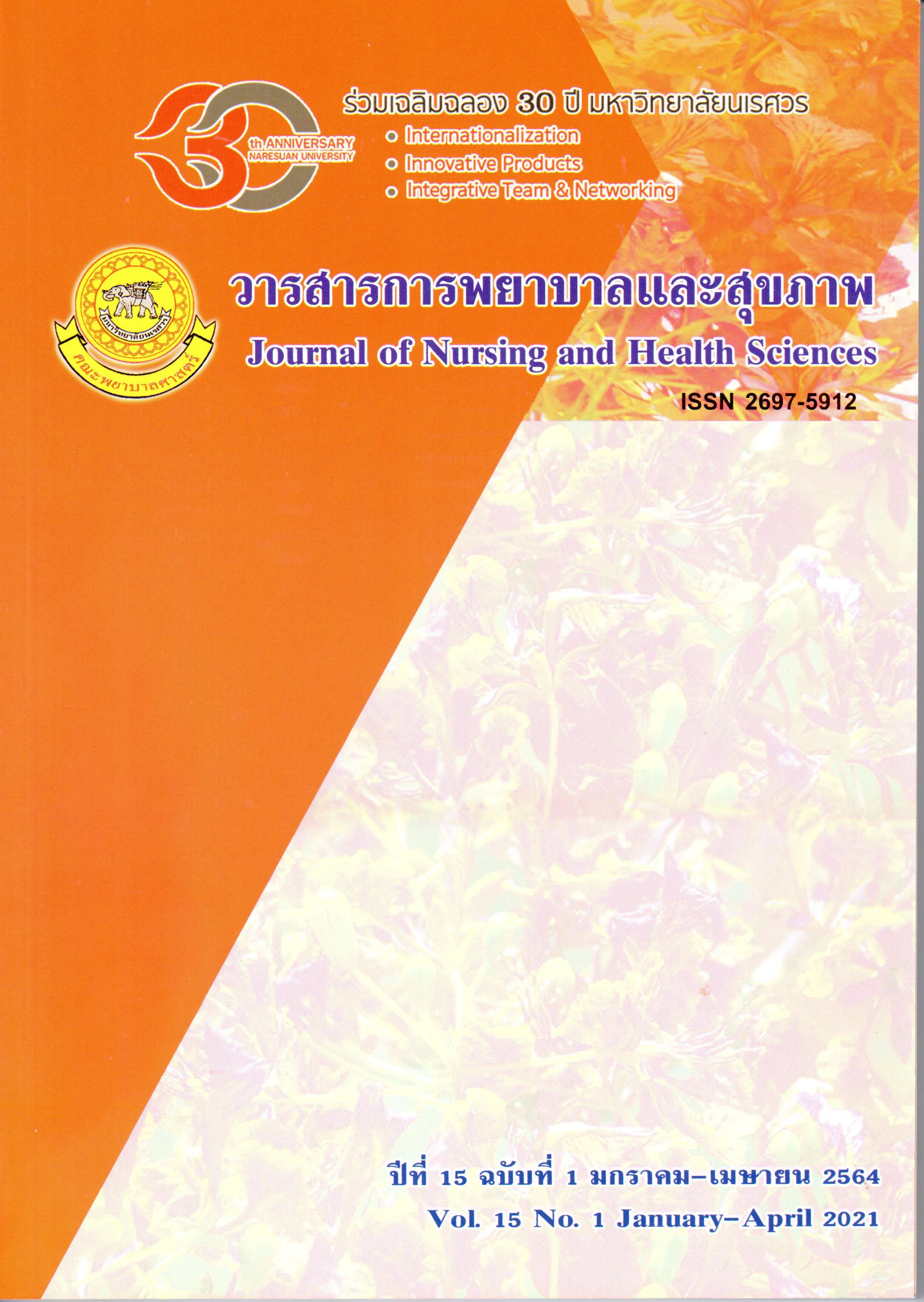ผลของการฝึกประสบการณ์ภาคสนามโดยใช้การสะท้อนคิดต่อความรู้สึกเห็นคุณค่าในตนเอง ของนักศึกษาพยาบาล
Main Article Content
บทคัดย่อ
การวิจัยกึ่งทดลองแบบสองกลุ่มวัดก่อนและหลังการทดลอง ครั้งนี้มีวัตถุประสงค์เพื่อศึกษาผลของการฝึกประสบการณ์ ภาคสนาม โดยใช้การสะท้อนคิดต่อความรู้สึกเห็นคุณค่าในตนเองของนักศึกษาพยาบาล กลุ่มตัวอย่างคือนักศึกษาพยาบาลชั้นปีที่ 3 จำนวน 32 คน สุ่มตัวอย่างจากผู้ที่มีคุณสมบัติตามเกณฑ์คัดเข้า แบ่งเป็นกลุ่มทดลอง 16 คน กลุ่มควบคุม 16 คน กลุ่มทดลองได้รับการฝึกประสบการณ์ฯโดยใช้การสะท้อนคิด ส่วนกลุ่มควบคุมได้รับการฝึกประสบการณ์ฯ ตามปกติ เครื่องมือที่ใช้ในการเก็บรวบรวมข้อมูล คือ แบบสอบถามความรู้สึกเห็นคุณค่าในตนเองของรูบิน ค่าความเชื่อมั่น เท่ากับ 0.88 วิเคราะห์ข้อมูลโดยใช้สถิติเชิงพรรณนา และ t-test ผลการวิจัยพบว่า 1) คะแนนเฉลี่ยความรู้สึกเห็นคุณค่าในตนเองของกลุ่มทดลอง ก่อน หลังการฝึกประสบการณ์ฯ ไม่แตกต่างกัน 2) หลังการฝึกประสบการณ์ฯ กลุ่มทดลองมีคะแนนเฉลี่ยความรู้สึกเห็นคุณค่าในตนเองสูงกว่ากลุ่มควบคุม อย่างมีนัยสำคัญทางสถิติที่ระดับ .05 ดังนั้นจึงเสนอว่าควรนำการฝึกประสบการณ์ภาคสนามโดยใช้การสะท้อนคิดไปใช้ในวิชาอื่นๆ เพื่อพัฒนาความรู้สึกเห็นคุณค่าในตนเองของนักศึกษาพยาบาลอย่างต่อเนื่องและสูงขึ้น ซึ่งจะนำไปสู่การแก้ปัญหาต่าง ๆ ในชีวิตตนเอง และการบริการสุขภาพที่มีประสิทธิภาพ
Article Details

อนุญาตภายใต้เงื่อนไข Creative Commons Attribution-NonCommercial-NoDerivatives 4.0 International License.
เอกสารอ้างอิง
Announcement of the Ministry of Education. (2017).
Bachelor's degree qualifications of Nursing
Science 2017. retrieved 15 September 2019 from
http://www.mua.go.th/users/tqf-B5.PDF. [In Thai]
Boontham, A., Yutawisut, S., Buaengdeung, T.,
Kaewprom, C., Rungruang, K. (2015). Development of reflective behavior among nursing
students. Journal of Clinical Medicine Education
Center Phrapokklao Hospital, 32 (3), 244-255.
[In Thai].
Boromarajonani College of Nursing Buddhachinaraj.
(2017). Bachelor of Nursing Science Program
updated Curriculum in 2017. Phitsanulok :
College of Nursing. [In Thai].
Boromarajonani College of Nursing Buddhachinaraj.
(2018). Self-Assessment Report for Academic
Year 2018. Phitsanulok: College of Nursing.
[In Thai].
Cassedy,P. (2014). Theories for Mental Health Nursing:
A Guide for Practice. London: SAGE.
Iamkongsi, S. (2018). Classroom management in the
stcentury. Chonburi: Triple Group Co., Ltd.
[In Thai].
Ibrahim, F. (2011). Nursing theme for love and pride in
the profession. Nonthaburi: Thanapress.[In Thai].
Kanhadilok,S., Punsumreung, Tr., &Pookpan, S. (2017).
The Integrated Clinical Teaching Methods on
Reflective Thinking, and Clinical Judgment in 3rd
Year Nursing Students in Maternal Infant and
Midwife Nursing Practicum Course I. HCU.
Journal of Health Science, 20(40), 87-99. [In Thai].
Likkhachai, S. (2011). Effect of using the program on
self-esteem of secondary school students in
grades 1-3 at Loi Sai Memorial School Ladprao
District Office Bangkok. Master of Education
(Psychology), Srinakharinwirot University,
Bangkok. [In Thai].
Morrison-Valfre,M. (2017). Theories and Therapies .
In M.Morrison-Valfre,(Ed.), Foundations of
Mental Health Care(6th Ed.) (p.46). China: Elsevier.
Pholprasert, P. & Witayathawornwong, P. (2016).
The effectiveness of group processes in improving
the quality of life of the elderly. Based on the
Sufficiency Economy Principle: A Case Study of
Lom Kao District Phetchabun Province. Journal
of the Association of Preventive Medicine of
Thailand, 6 (3), 244. [In Thai].
Pongpruek, K. (1980). Relationship between appropriate
behavior in the expression of anxiety and selfesteem. Master Thesis (Education), Chulalongkorn
University, Bangkok.[In Thai].
Rittikupt, W. (2015). The results of teaching and learning
management by using notes-writing activities.
Cognitive education. Ratchaphruek Journal.
(2), 27-34.[In Thai].
Sanguansiritham, U. & Sirakamol, S. (2015). Ethical
behavior of professional nurses. Chiang Mai:
Siam Pim Nana. [In Thai].
Sirilai, S. (2013). Ethics for nurses. (13th Ed.). Bangkok:
Chulalongkorn University. [In Thai].
Uppai, N. (2015). Educational psychology. (4th Ed.).
Bangkok: V. Print (1991). [In Thai].
Urakane, P. (2019). Innovative creation of design art
from art as therapy concepts to raise self-esteem
inchildren from dysfunctional family. Master
Thesis (Fine Arts Design Arts), Silpakorn
University, Bangkok. [In Thai].
Wanchai, A., Saengpak,C., &Lueangsomnapa, Y. (2017).
Instructional Management Using Reflection
Techniques in Nursing Education. Journal of
Research in Health Sciences, 11(2), 105-115. [In Thai].


